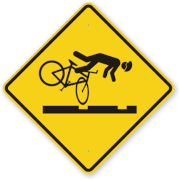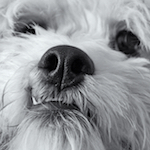|
Cranbe posted:So my adult Labrador was hit by a car this morning and broke her hip pretty thoroughly. She'll be having surgery this afternoon, including screws and plates. You will need a crate to confine her in - you want her to not be able to move much, and especially no jumping or rising on hind legs. Minimal movement will be necessary for recovery. In some dogs where they cannot stay calm, you may have to go with sedatives or other medications to keep her calm. When she needs to move, it will be essential to make sure that she does not fall or otherwise strain or injure her surgical areas. I recommend a walking harness for the back legs similar to the one here: http://www.handicappedpets.com/rear-harness-to-help-dogs-and-cats-walk-1.html however the veterinarian performing the surgery may already have preferred walking assistance devices so you'll have to find out from them. Always remember to have her on a leash when she is outside the confinement area, and always have an excellent hold and good knowledge of the situation. If there is anything exciting possibly coming (squirrel!) hang on tight, maybe even give her a body hug to make sure she doesn't try to spring off on her back legs. Good luck!
|
|
|
|

|
| # ? May 14, 2024 05:48 |
|
Ok, so every time I take the puppy out to go, which she is pretty good at, however, when we are outside she eats everything. I mean anything and everything, we live in an urban area so there are stones from the street, leaves, berries from trees, cigarette butts. If there is anything on the ground she tries to eat it, and it's got me worried. The rescue said she's only had one round of boosters, and she won't get her next until 12 weeks (she's about 9 weeks right now) and to be very cautious and to avoid dog parks, grassy areas in general and the like as a preventative measure until she gets that worked out. Anything I can do in the meantime?
|
|
|
|
Sab0921 posted:Ok, so every time I take the puppy out to go, which she is pretty good at, however, when we are outside she eats everything. My dog has done this same thing since we had him around the same age as yours, and it's not easy but here's what you have to do: A) bring very high-value treats on walks and if the dog tries to eat anything dangerous, use them to distract redirect and make them drop it. Start working on redirecting this eating/grabbing behavior towards delicious treats and just keep doing this, consistency is key. Don't EVER be angry or aggressive about it or your dog will just hoard their treasures even more fiercely. Also if the behavior stays for long enough you'll just develop a kind of intuition for avoiding really bad spots, like at this point I have a sixth sense for cigarette butts. As an aside, smokers are loving gross inconsiderate assholes who leave their disgusting trash everywhere, and having a puppy has taught me to hate cigarettes with a renewed vigor. B) Teach leave it and drop it ASAP. Start inside and do a refresher lesson before each walk, because leave it and drop it outside with distractions are a bajillion times harder. As always use really good treats for this, because no matter how gross the thing the dog is eating actually is, to them it's their glorious prize and probably tastes like a thousand chickens stuffed inside turkeys wrapped in bacon. Spengelbeiser fucked around with this message at 21:59 on Sep 21, 2013 |
|
|
|
^^^ won't that just train her to sniff and pick up random stuff so she will get treats? Yeah, I need to start clicker training her. We got her yesterday, and are still working on liking the crate. Sab0921 fucked around with this message at 00:20 on Sep 22, 2013 |
|
|
|
Sab0921 posted:^^^ No it won't, but I wouldn't start with default leave its until you've started with some other behaviors first, and it sounds like you haven't done any of that.
|
|
|
|
MrFurious posted:No it won't, but I wouldn't start with default leave its until you've started with some other behaviors first, and it sounds like you haven't done any of that. I'm trying. We've had her for all of a day and a half. She has taken to the crate pretty well (sleeps through the night, very little crying and fussing, very few accidents outside of the crate). Like the puppy training thread says, I'm trying to "charge" the clicker to get her to associate it with getting a treat. Tomorrow or the day after (day 3 and 4) I will start attempting operant conditioning. She needs to get used to our home, and also to our other dog. Clicker training is new to me too, we trained our other dog without a clicker, just through patterning with our voices and treats and he is pretty good, but I think I can do better with the new pup, but am taking the time to do it right.
|
|
|
|
Yeah it takes awhile to get in the rhythm with the clicker, for now your best bet on walks is to just avoid trashy areas as much as possible and use other indoor techniques to tire that dog out as much as possible. You probably don't want to be over walking a puppy who isn't acclimated to clicker training anyhow, since you'll develop bad walk and leash habits without a method to remedy them. Fixing bad habits is a lot harder than developing good ones with a fresh start.
|
|
|
|
Sab0921 posted:Ok, so every time I take the puppy out to go, which she is pretty good at, however, when we are outside she eats everything. Do you have access to a small, relatively controlled area where you can walk the dog to eliminate? Say like a small yard or something like that or a quieter part of a park? If you can try to anticipate what's on the ground it can help you be on the look out for her foraging. I understand that that's not always possible, especially when you are walking to or from a potty destination, so maybe either carry her (I know that's very fur mommy-ish, but its the easiest solution) to the area, or walk fast enough that she doesn't really have a chance to scout out whats on the ground. You could also start clicking for eye contact while on leash, basically teaching you pup that looking at you or making eye contact is very rewarding- she'll be more likely to look to you for some tasty treats after a while than looking at the ground for tasty treats. You can try this at first at home or in really boring environments so she's really likely to succeed. This will also build good leash behaviors for her later in life. Basically, initially you want to click for her looking at you even for a very short time, and then making eye contact, etc. It should be a snap to teach! Use some really high value (stinky/ tasty) treats.
|
|
|
|
So I started the clicker training recently, and want to make sure I'm doing it correctly. I didn't use the clicker for the crate, but she's really good with it. She likes the crate (still doesn't use it as her go to spot though) and sleeps well throughout the night. It's helped with house training -- though she thinks that out of crate means potty time, so she has had one accident when my wife let her out and she went straight to pee. Other than that, she had an accident when she got scared of the vacuum cleaner. She has never gone in her crate which is awesome. I want to make sure I'm doing clicker training correctly. I began by charging the clicker using various treats (kibble, cheese, regular dog treats) by clicking and giving her the treats immediately. I did probably ten sessions of that over two days. Today I began trying to teach her sit. I've been using kibble as the treat, and whenever she puts her butt down, I click and then treat. She seems have gotten that. I want to know how to introduce the verbal cue to sit. Do I just do another session with the clicker and treats and start saying sit before she actually does it? Also, is there a specific order I should go? Sit, Down, Come, Heel etc? or does it not matter? Should I have a different hand cue for each action, how can the 9 week old puppy differentiate what I want from her, when she gets the click and treat? I'm kind of apprehensive, that the clicker is just going to make her sit everytime now. I might be paranoid, but any advice to a novice clicker trainer is welcome. She's a great dog btw, a rescue puppy is of I have no idea what breed. Edit: scratch that. As I was typing this out she had an accident on the floor, that's three times just today, after not doing it at all before!
|
|
|
|
Sab0921 posted:sits From the op: quote:Sit
|
|
|
|
Man, Penny has sit down pat, but stay is proving to be a huge hassle. She just so badly wants to be near me  Also she's been giving me the coppertone ad treatment every time I go outside in the garden with sweatpants on. She loves pantsing me and I'm struggling to catch it before it happens.
|
|
|
|
Martytoof posted:Man, Penny has sit down pat, but stay is proving to be a huge hassle. She just so badly wants to be near me I don't know how you're teaching stay, but I would wager heavily that it's not quite right. What are you doing right now and when is she breaking the stay?
|
|
|
|
MrFurious posted:What are you doing right now and when is she breaking the stay? You could have just said this part, you know, without saying "you're doing it wrong." I've found my clients to be more compliant and responsive when no blame is being placed for things not happening the way they want. Stay is especially difficult, and it often feels like you hit a wall at certain points - adding disappear and going directly behind the dog seem to be the most challenging by far. If you hit a wall, go back to the last place where it was still able to happen, then baby step it toward the new goal.
|
|
|
|
ButWhatIf posted:You could have just said this part, you know, without saying "you're doing it wrong." I've found my clients to be more compliant and responsive when no blame is being placed for things not happening the way they want. Also important to remember that you need to make small changes in what you are asking for. If you want the dog to stay when you go behind them, start by initially asking them to stay when you move to the side, and reward for that until they seem to have that down. Basically you want to slowly raise your criteria for what you want in the stay. Also, try to have your dog practice the stay in a really really boring location so that there's no reason for them (outside of you!) to get up and move around.
|
|
|
|
I've been asking her to sit, then down, then stay, all while sitting in front of her, rewarding after each command. She's fine with sit and down, and a rudimentary stay works, but the second I try to introduce any movement at all, gentle rocking side to side, any sort of distraction, she just up and starts in for my lap. If I try to hold stay for a long period of time without any feedback after the initial reward she also seems to get bored and just puppy-ADHD noses around.
|
|
|
|
Martytoof posted:I've been asking her to sit, then down, then stay, all while sitting in front of her, rewarding after each command. She's fine with sit and down, and a rudimentary stay works, but the second I try to introduce any movement at all, gentle rocking side to side, any sort of distraction, she just up and starts in for my lap. If I try to hold stay for a long period of time without any feedback after the initial reward she also seems to get bored and just puppy-ADHD noses around. Have you tried asking for those behaviors while standing? Typically you'll be standing when you ask her to do those things anyways and it might be easier for both you and her to get used to that now. Since dogs are not good at generalizing, it might take a little for her to get sit and down again, but you'll thank yourself later that you moved on to standing sooner rather than later. If she's taking movement as a cue to jump in to your lap, she can't do that if you are standing. If she's getting bored, work on short stays and get those down and keep training sessions short to keep her from getting bored or frustrated.
|
|
|
|
I'll do that for sure. Part of it is that I've only just started working with her so obviously I'm asking for a lot in a short amount of time. I don't doubt at all that she'll get it, it's just hard to transition to remembering that a puppy is a dumb little babby dog when you've had grown trained dogs for the past 10+ years Good feedback, thanks everyone!
|
|
|
|
ButWhatIf posted:You could have just said this part, you know, without saying "you're doing it wrong." I've found my clients to be more compliant and responsive when no blame is being placed for things not happening the way they want. Nah, gotta Alpha-roll them n00b posters to make sure they know who's boss. I mean, being a condescending prick is how PI rolls, right? But for actual content, as stated, stay is a bitch. Asa's stay is acceptable to me, if not great. She won't go for her food dish until I let her, she'll stay on a mat/few other places, so it works. Sucks outdoors, but I'm out of practice. Its one of the basic's I wish I'd known more about when I got her, since I think I did too much bad-training before I found good-training, and now I'm just too lazy to fix it.
|
|
|
|
Martytoof posted:I'll do that for sure. Part of it is that I've only just started working with her so obviously I'm asking for a lot in a short amount of time. I don't doubt at all that she'll get it, it's just hard to transition to remembering that a puppy is a dumb little babby dog when you've had grown trained dogs for the past 10+ years That's okay- I didn't want to say that I think you are asking for too much too soon since dogs ( a lot like people) can have different learning styles/ learning speeds. Good on you for starting early and working hard!
|
|
|
|
Martytoof posted:I'll do that for sure. Part of it is that I've only just started working with her so obviously I'm asking for a lot in a short amount of time. I don't doubt at all that she'll get it, it's just hard to transition to remembering that a puppy is a dumb little babby dog when you've had grown trained dogs for the past 10+ years The way we start teaching dogs stay in my classes are that we have the dog sitting beside us in heel position (having done a week or two of rewarding for sitting in heel position already). We cue the dog to sit, we cue the dog to stay by gently saying the cue (people tend to want to yell it or say it sternly) and waving our hand gently a few feet away from the pup's nose, palm towards the dog. Then, we stand there for a second... and reward. You didn't go anywhere, but neither did the puppy, so the pup gets a reward because, hey, it stayed. Reinforce the puppy 2-3 more times for holding a sit for a second without you going anywhere before starting to add movement. Start slow by just pointing a toe forward, then back (you've not travelled anywhere, just added movement). Once your pup is solid at that, shift your weight forward. The next step is taking one step forward. The step after is stepping forward and pivoting in front of the dog, then back. The way we like to teach it is a) working with the dog in heel position, b) not rewarding for a stay until the handler has moved back into heel position (because heel position is a reinforcement zone where awesome things happen) and c) ensure that you ALWAYS RELEASE after each exercise. Release your dog before it decides to release itself. A self releasing dog has a pretty lovely stay. Just some pointers! I tend to see people trying to move too far too fast when teaching stay, and they end up with stressed and unhappy dogs.
|
|
|
|
How do you teach a release? In what order should you teach it? Teach to sit, stay, release in that order before moving to the longer stays?
|
|
|
|
Sab0921 posted:How do you teach a release? In what order should you teach it? Lure/shape/cue dog into a sit, then say "okay!" and encourage the pup to move. Lure/shape/cue dog into a down, then say "okay!" and encourage the pup to get up. Basically, you should be teaching a release the moment you start teaching a control behaviour (sit/down/stand). Technically the stay should be implicit in the sit/down/stand cue. Saying "stay" is really more of a courtesy than anything else. So I wouldn't bother really teaching the dog a formal stay at this point, just test the boundaries of the pup's understanding by waiting a variety of times before saying okay and make it worth the pup's while to listen for its release. e: I use "okay" and "break" as my releases. Some people use "free". Use whatever you want. Though, using a word like "okay" that comes up in everyday conversation will result in your dog thinking you're releasing it when you don't mean to.
|
|
|
|
I noticed that there is getting to be a fair amount of wax in Mile's ears now, is that something I should clean out? Are there any techniques or products I could use to do so?
|
|
|
|
a life less posted:Lure/shape/cue dog into a sit, then say "okay!" and encourage the pup to move. Lure/shape/cue dog into a down, then say "okay!" and encourage the pup to get up. Basically, you should be teaching a release the moment you start teaching a control behaviour (sit/down/stand). I've been trying to refine my technique with stay and release, but when does a treat come into play? Last night I was working on distance so I did stay, step back, release then treat. She walks towards me and then immediately sits again and I repeat the exercise. Making sure I'm doing it in the right order.
|
|
|
|
What ought I be doing to teach the puppy to sit a little longer. Not necessarily "stay", but I'll do: "sit" *puppy sits* *treat* "good girl" *puppy gets up after half a second* She obviously understands sit, but how can I get her to hold the position a little longer than she is? I mean I guess this ties into the stay thing we discussed above, but I wanted to be sure.
|
|
|
|
cheese eats mouse posted:I've been trying to refine my technique with stay and release, but when does a treat come into play? Last night I was working on distance so I did stay, step back, release then treat. She walks towards me and then immediately sits again and I repeat the exercise. Making sure I'm doing it in the right order. The way I recommend is cue sit -> cue stay -> move/wait (depending on whether you're working on distance/duration) -> return -> treat in place -> release. Note that you're feeding the dog in the position you are rewarding. If you feed after the dog has gotten up, you're basically rewarding the release. You want to pay into the sit/stay to make that behaviour more valuable to the dog. Also, while working on stay, it's helpful to intersperse training sessions with play or other fun obedience. It keeps the exercise more engaging for everyone. Also also, when you cue your dog to stay and then you move, don't have food in your hand. Food in the hand will likely lure the dog to break the stay. Grab a treat from your bait pouch upon your return. Martytoof posted:What ought I be doing to teach the puppy to sit a little longer. Not necessarily "stay", but I'll do: Treating almost always signifies the end of an exercise. In your situation, if you want to work on duration then I would increase the amount of time the dog has to wait between the cue/action and the reward. Increase duration in very small increments. People normally want to increase duration by 2+ seconds at a time (I've seen novices asking for 5-10+ seconds right off the bat -- way too long!). Try to increase duration by 0.5 seconds at a time max. Also release right after the dog has the treat so you don't give the dog too much time to self release after the reinforcer. Eventually you can train a dog to continue working after getting a treat, but it's a bit advanced for a wee puppy.
|
|
|
|
I can definitely use this advice. Thanks, I'll try it out today 
|
|
|
|
How old should Sage be before I can have him to join me on my daily runs? My lab-mutt and I go running about five-eight miles a day in the mornings - well. I run that, Flynn gets to be off leash and mostly runs circles around me, so I have no idea how much he actually goes for. I haven't been taking Sage with me because PI has previously cautioned that too much on growing puppy bones can be a bad idea. Sage is about eight months old now. Is he well enough grown to start joining us on those runs or should I be holding off for a bit longer?  EDIT: Oops, I was catching up on the thread after asking and see about eight pages back you guys suggested waiting until 18 months for a doberman/mastiff sized dog. Sage wont be getting that large - he's about 50-60 lbs right now and is a mutt of questionable origin, but is that the appropriate time frame for him also? We dont run on concrete, though there is a short stretch of tarmac and plenty of gravel. I take them out to an abandoned school and we basically just run laps through the compound/football and soccer fields and the empty areas around it. Arbor fucked around with this message at 20:20 on Sep 25, 2013 |
|
|
|
Man, when do I get to sleep again? This puppy is a pee/poop machine.
|
|
|
|
Sab0921 posted:Man, when do I get to sleep again? This puppy is a pee/poop machine. How old? Ours is 12 weeks and she pretty much sleeps through the night most nights. The last two nights she's been out at midnight, then again at 4am, and at 7, but that's just because I'm waking up and being cautious. In general I'd say that the bigger problem with mine is that she likes to nap during the day and then she's all awake at night so even when I put her to bed she's up at 4am chewing a toy in her kennel or something. Since she sleeps next to the bed it makes sleeping difficult if she's being noisy. I think I need to do a better job of keeping her awake during the day so she's tuckered out at night. Today she's being really good about not being a brat at night but it's hit or miss sometimes.
|
|
|
|
Martytoof posted:How old? Ours is 12 weeks and she pretty much sleeps through the night most nights. The last two nights she's been out at midnight, then again at 4am, and at 7, but that's just because I'm waking up and being cautious. Our pup is 9 weeks old, and she does well sleeping through the nights for the most part. She can from about 11-6, but after 6, she can't be stopped, she needs to be awake and playing and releasing all the energy in the world. So sleeping past 6 is a thing of the past at the moment. How much time do you spend with the clicker with your pup per day?
|
|
|
|
Be cautious about keeping your pups too active during the day. Puppies who don't get sufficient chances to nap will happily go all day, but just like a toddler they get petulant and irritable when tired. I've seen some chronic behaviour problems crop up with chronically overtired pups. They also learn to expect what you're giving them, so you can create a dog who expects 6+ hours of play/walks a day (like I did with mine...). I would just tough out the night time restlessness (providing potty breaks if necessary). The puppy will eventually understand that nights are for sleeping.
|
|
|
|
a life less posted:Be cautious about keeping your pups too active during the day. Puppies who don't get sufficient chances to nap will happily go all day, but just like a toddler they get petulant and irritable when tired. I've seen some chronic behaviour problems crop up with chronically overtired pups. They also learn to expect what you're giving them, so you can create a dog who expects 6+ hours of play/walks a day (like I did with mine...). I would just tough out the night time restlessness (providing potty breaks if necessary). The puppy will eventually understand that nights are for sleeping. As the up grows older they will calm down as well. Our Lab/retriever is 5 months old and can sleep multiple times a day. We put her to bed at 9:50 usually and can sleep until 7:30. As her bladder control get's better though you can leave her in the crate longer. She will whine but just make sure when you first get up you do not let her out immediately. She will associate the whine with you getting out of bed. We generally walk around, make a coffee, use the restroom then let her out. We also only let her out of her crate if she sits/downs for us. Using this tactic we managed to sleep in until 9AM one morning. Once she is old enough we will let her have the roam of the house but I want her to know that late night is sleep time.
|
|
|
|
a life less posted:They also learn to expect what you're giving them, so you can create a dog who expects 6+ hours of play/walks a day (like I did with mine...). Conversely this adaptability can be the best thing about dogs. I work full time, so Tater's alone during the day and we hit up the dog park for a couple hours when I get home. Now even if I'm working from home he's on a 3 hours on, 21 hours off schedule where he'll be amped up when Dog Park Time rolls around but is quiet otherwise, with a bit of activity around 7am which is when I'd usually be getting ready for work.
|
|
|
|
I hope this is ok to ask in the thread. I'll be getting a puppy next year (on the waitlist) and have been getting ready for his/her arrival. One of things that I have some confusion about is pet insurance. I have never dealt with pet insurance before so I hope you can be patient and the more advice given, the better. I was advised to go with VPI and to start as soon as I get the pup under my care (8-10 weeks). VPI will only cover dogs at 6 weeks old minimum, so this works out. I got a "quote" for an 8 week old pup of the corresponding breed and got the option of accidents, economical($23) and comprehensive($30) with the option of adding on routine care; core ($12) or premium ($22).  1. I need some clarification on this terminology and $$ portion. Looking at the Comprehensive plan, it says "$250/year" deductible and then $14,000 max benefit. So I have to pay $250 out of pocket before they'll cover anything up to $14,000? And then, the Core Care Guard has $400 max benefit. A spay/neuter costs $325 at the local pet hospital and VPI will cover $100 of it. So this means that I only have $300 more claim from them? 2. Primary and secondary allowances. "Primary Allowance is the benefit limit for the primary condition or procedure. This includes exam, diagnostic testing, prescriptions, injections, hospitalization,treatment, anesthesia and surgery. Secondary Allowance is the benefit limit for the condition or procedure that is treated along with the Primary Diagnosis condition or procedure." How does the insurance determine what is primary and what is secondary? If I bring in my dog for some dandruff issues and the vet makes an additional discovery of mysterious lump under the skin. Would the more expensive lump be considered primary or the dandruff be primary because that is what I brought the dog in for? 3. The breeder tests all her pack members for hereditary problems and she keeps track of all the pups that left her home and the siblings of her pack. So far, there are no reports of hereditary issues. I'm wondering if I need to get the comprehensive one so soon (or ever). Do insurance companies allow you to do a lower tier one for like say 7 years and then switch to a higher one? Will the price difference make me balk at switching in the future? 4. I'm tempted to get the Core Care Guard. If I find it not very useful, am I allowed to just cancel that portion without affecting the base plan pricing? Sorry for all the questions that seems basic and logical. I can be quite 
|
|
|
|
Personally I don't put much stock into pet insurance. All pet insurance I've seen pay in arrears -- you pay the full cost to the vet, then fill out the claim and hope they decide to pay out. If they don't then you don't have much recourse apart from switching providers. Plus statistically for-profit insurance is always a losing proposition for the consumer. If it's gonna be a few months before you get the pup anyway I'd say start saving for vet bills now into a savings account or something.
|
|
|
|
I just went to an animal shelter and it was one of the most depressing experiences of my life. I want to adopt a dog and am taking my time finding the right one but after today I just feel kind of sick. I understand why people say adopt from shelters and not from other places but geesh. I just want to curl up in a hole and hide now.
|
|
|
|
I stopped going to shelters because I want to walk out with every dog. I compromised with myself and walked out with ONE, and I'm going to volunteer to do adoption photos instead of taking the rest.
|
|
|
|
Eegah posted:Personally I don't put much stock into pet insurance. All pet insurance I've seen pay in arrears -- you pay the full cost to the vet, then fill out the claim and hope they decide to pay out. If they don't then you don't have much recourse apart from switching providers. Plus statistically for-profit insurance is always a losing proposition for the consumer. I keep reading posts in PI where the OP is "my dog/cat is doing [something weird]" and when they go to the vet, they have a bill in the thousands and other posters say, "that's why I have pet insurance." My friends who own dogs all have pet insurance. Granted, they didn't get it until Fido was listless or having bloody poop and they got a sticker shock. There seems to be a lot of conflicting advice on this topic though.
|
|
|
|

|
| # ? May 14, 2024 05:48 |
|
Eegah posted:Personally I don't put much stock into pet insurance. All pet insurance I've seen pay in arrears -- you pay the full cost to the vet, then fill out the claim and hope they decide to pay out. If they don't then you don't have much recourse apart from switching providers. Plus statistically for-profit insurance is always a losing proposition for the consumer. Personally, I just spent $8,000 on emergency surgery after my dog was hit by a car and am frustrated I put off buying pet insurance so long. Edit: I guess I'm not really sure how well pet insurance plans pay out for emergencies/accidents, but I imagine they at least pay some. If so, I think it would absolutely be worth it, if only to not have to even entertain the lovely conversation with the vet: "The other option is euthanasia." Cranbe fucked around with this message at 01:41 on Sep 27, 2013 |
|
|



















